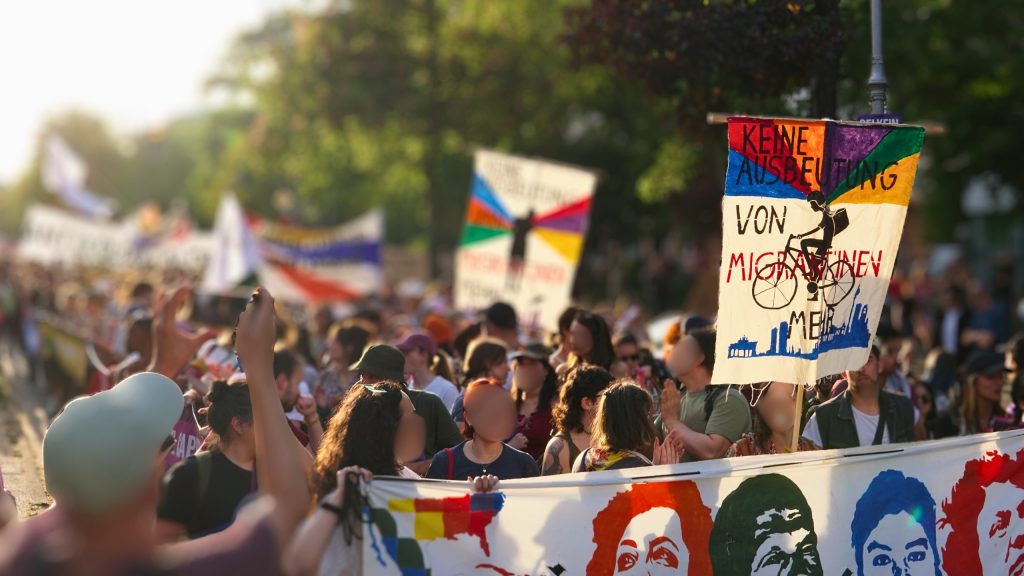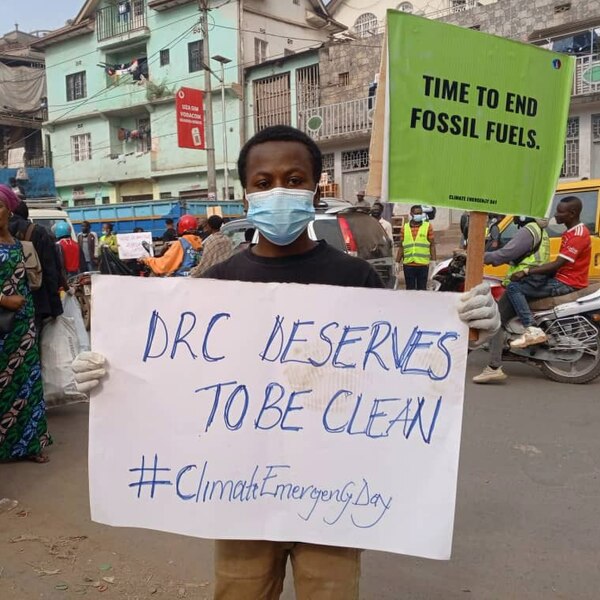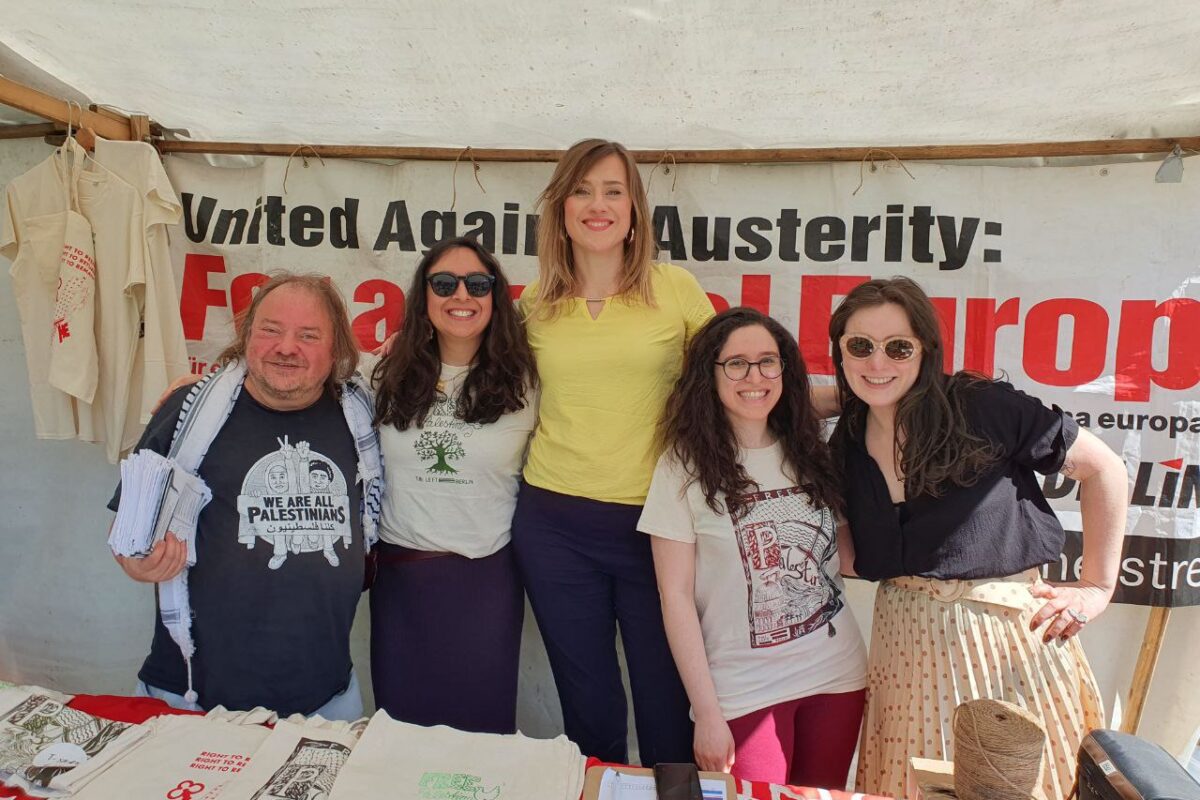“We are like quinoa grains. Alone, the wind disperses us. But united in the same pot, the wind cannot move us. It will shake us, but it will not topple us.“
Dolores Cacuango (Indigenous Ecuadorian leader)
1. Another First of May: the rich even richer, the extreme right, and the world on fire
We live in dark times. Every day we receive news that seems straight out of a dystopian future, but which describes our current reality. As food prices rise, rents skyrocket, and wages stagnate, ever more images of war, genocide, and environmental catastrophes flood our screens. The global situation is complex and, at the same time, alarmingly clear in one respect: the wealthiest 1% of the population seizes every opportunity to get even richer by exploiting and destroying people and nature.
Since the pandemic, the wealth of billionaires and global inequality continue to rise. On average, in 2024, each billionaire’s fortune grew by $2 million a day. The ten richest men increased their wealth by $100 million a day, while 50% of the world’s population lives on less than $5 a day. It’s a scandal that the gap between those of us who toil away the day, working precariously, and those who steal our jobs is widening every day!
We are witnessing and experiencing the accelerated reconfigurations of neoliberal capitalism that manifest themselves as authoritarian shock therapy. Less and less money for bread and more and more money for weapons! The ruthless greed of those at the top, seeking to secure the profit rate, doesn’t fear death, but rather the death of those bodies and territories considered disposable: the Palestinian people, migrants drowning in the Mediterranean, forests on fire…
The oligarchy, in Latin America and elsewhere, has never needed to be in government to exercise its dominance, as it possesses not only the means of production but also the hegemonic media and the increasingly sophisticated tools of financialized capitalism. However, today, big business, within its national-global framework, is increasingly assuming direct political control, as evidenced by the explicit alliance between corporations and far-right politicians.
Trump’s inauguration party at the end of January 2025 left us with a bitter glimpse of the authoritarian international scene. While Silicon Valley’s “Trump bros” championed the xenophobic leader, the anarcho-capitalist Javier Milei and the far-right drug trafficker-president Daniel Noboa, along with their respective “first ladies,” posted selfies on Instagram to boast about their front-row seats. A month later, at the Conservative Policy Action Conference (CPAC), to the cheers and jubilation of the far-right audience, Milei offered Elon Musk his infamous chainsaw “to dismantle the state bureaucracy.” These alliances, clear examples of neoliberal austerity and authoritarian radicalization, symbolize the new capitalist ways of carrying out exploitation and repackaging its aesthetics.
Worldwide, in imperial centers as well as the peripheries and resistance zones of the South, authoritarian neoliberal governments are dismantling social systems and attacking historic gains of popular movements. The destruction of the state as the guarantor of social security is in full swing everywhere. Argentina under Milei is up in arms against ruthless cuts to education, healthcare, gender equality policies, and much more. Enforcing this austerity, the repressive forces of the state even brutally beat retirees in the streets. In Ecuador, which is approaching almost a decade of authoritarian neoliberal regimes, the belated unity of the left was unfortunately not enough to defeat the fascism that fraudulently imposed itself at the polls in April 2025. If Argentina is a test laboratory for repressive neoliberalism, Ecuador is a sacrifice zone, where the narco-right murders Afro-Ecuadorian children to fill their pockets with bloody dollars. In memory of Josué, Ismael, Saúl, and Steven, our struggle continues!
Noboa’s banana shipments arrive with cocaine at raves in a Europe that also bets more on death than life. In Germany in particular, the “grand coalition” between the Christian “democrats” (CDU/CSU) and the authoritarian “social democrats” (SPD) did not hesitate to cut social benefits from childcare infrastructure to cultural projects. The icing on the cake has been their openly xenophobic policy, not only restricting immigrant rights but also advocating for our mass deportation. Given this situation, it does not surprise us at all that the neo-Nazi AfD party has established itself as the second-largest political force nationwide in the February 2025 elections. There is no need for the AfD in the grand new-old coalition between the CDU and SPD, because these parties are only democratic in name. We denounce this loud and clear: their government plan enhances the far-right attack against us, the immigrants, and those at the bottom!
Thus, the authoritarian state grows under the guise of a supposed democracy. The Europe of the upper echelons is re-arming to the teeth to radicalize this phase of capitalist accumulation, focusing industrial reconversion on the manufacture and export of sophisticated weapons. Wars abroad and an iron fist within! The German state has never de-Nazified itself and has always been repressive. However, since its exacerbated participation in profiting from the genocide in Palestine, it has become even more repressive, and its police force, even more savage. And fundamental rights, from the right of assembly to free expression? Trampled. We will never forget that they want to prohibit us even from mourning. Fascist boots trampled on the candles of the vigils on Sonnenallee when we mourned so many dead in that bloody autumn of 2023. This escalation of violence affects a society that, due to the rising cost of living and growing uncertainty, is increasingly pressured and outraged. In Germany and around the world, precariousness is spreading. The working class and increasingly the impoverished middle class are having to cut back on basic needs like food and clothing to make ends meet.
This harsh reality is no coincidence. It’s the result of a system that concentrates wealth at the top and generates poverty at the bottom. It’s the global breeding ground for the rise of far-right movements with fascist practices or aspirations.
2. Fascism is not to be debated, but fought? But, it is people who vote for the fascist, right?
Without a doubt, we are experiencing a period of right-wing political proposals globally. From the highest echelons of power, the authoritarian solution to the crisis is being consolidated, and parties of all stripes, seeking to maintain their good ties with these elites and appeal to their lost bases, interpret their political and media role by simply saying that society has “turned right.” A form of fatal, self-fulfilling prophecy.
Despite the widespread belief that fascism reigns among the popular sectors, it is essential to differentiate between right-wing parties and the people who vote for them today. In most cases, those who vote for or begin flirting with the right do so not necessarily because they are ideologically convinced, but rather as a response to the capitalist context of uncertainty, instability, and fear, as described previously.
We are facing a complex challenge. Although people often diagnose social problems the same way we do (“There are no decent jobs, my children can’t access quality public education, I’m afraid to go out, etc.”), it’s in the interpretation of who is to blame and what the solution to the crisis would be that the fascist right is winning the battle. According to Milei, the blame lies with “the shitty leftists,” according to Noboa, with the “drug-trafficking leftists,” according to the AfD and the grand coalition, with us immigrants.
The fascists are Milei, Noboa, and the AfD, but we on the left are doing ourselves no favors if we label as fascists the delivery driver who can’t make ends meet in a suburban neighborhood of Buenos Aires, the mother worried about her children in Guayaquil, or the worker in Brandenburg who needs to understand why his wallet is emptying even as the calluses on his hands grow. Our historic task is to re-interpellate these sectors, creating collective spaces where we can understand the many faces of the capitalist crisis and once again point the finger not at each other, but at the true culprits: the exploiters up high. Only by proposing and jointly building a social project that resolves our social problems and motivates the majority to fight for a dignified life can we avoid the real danger of a fascistization of society as a whole.
Classical fascism in Europe in the 1920s and 1930s emerged at a time of capitalist crisis as a way out of the liberal institutional engineering resulting from war, inflation, and falling productivity. It also emerged as a response to the rise of communist parties. This gained it the support of politicians, businessmen, and religious figures around the world. Thus, fascism developed as the elites’ emergency brake to prevent the popular sectors from seizing their privileges. Despite what Trump and Milei crudely shout, fascism and communism are not the same. At the same time, fascist regimes, proposing a new way of organizing society, the total state, and the economy, have managed to permeate society as a mass street movement. Let us recall the Voluntary Militia for National Security in Italy, better known as the Blackshirts.
The global far right is heterogeneous, and its fascist aspirations and practices vary. While some actors seek to revisit a supposedly glorious past by applying the same neoliberal recipes and using the same old hate speech, we are increasingly confronted with sophisticated expressions that are being articulated in areas of life they previously didn’t reach, such as youth movements and cultural spaces. We’re not just talking about governments or political parties, but about grassroots movements and TikTok influencers. Far beyond the electoral sphere, there is also a danger of social fascism in everyday life that we must avoid at all costs. We can start by separating the wheat from the chaff. Of course, we are fighting the leadership of the global far right parties. However, with knowledge that this isn’t always possible in terms of security, we must now more than ever talk to the precarious people who are voting for the right.
What we are experiencing is a profound crisis of capitalism and the rise of authoritarian conservative projects that seek to justify neoliberal austerity. Like any political process, this one is not totalitarian, but rather an evolution of political and class struggles. It will depend on us to prevent this slide toward terror from increasing, making fascism the only way out. It will depend on whether we organize, fight, and build an alternative to capitalism or not.
For immigrant communities, creating solidarity networks to help us with everyday problems is a daily routine. Like the work of small ants, we politicize these needs to raise our collective voice in the face of injustice and to propose self-organized solutions and alternatives for society. This is why we are excited by the popular leftist movements in Germany that are breaking out of their bubble and increasingly investing in grassroots work. This is the way forward. For example, the door-to-door campaign by comrade Ferat, from Die Linke in Neukölln, even managed to motivate young people to come from other cities to support us. At the Bloque Latinoamericano, we know that when you are passionate about a horizon of social transformation, camaraderie and collective construction become a profound part of your life. We invite comrades from leftist movements and parties in Germany to continue renewing their organizational strategies and to engage more with immigrant leftists. No one can save themselves alone, which is why we need to create broad alliances, from the left and from below, to truly build collective power/Gegenmacht.
3. Who is the number one enemy of the German state? It starts with “immi” and ends with “grants”
Migration to Europe is not a random phenomenon; it is a direct consequence of Europe’s plundering foreign and economic policies. Environmental destruction, military interventions, “free” trade agreements, and globally exploitative relations force people to leave their countries and their families. By demonizing immigrants, right-wing and “centrist” parties in Europe attack us. They foster racism and divide society, blaming us for their fate and hiding the true reasons for the capitalist crisis we are experiencing. They say we are to blame. That migrants steal their jobs, that we import antisemitism, that we fail to integrate, that we must “re-migrate”… This is the right’s strategy to divide the German and immigrant working classes.
However, it’s clear: Germany and other European countries need migrants as cheap labor, disempowered and silent. The entire system of immigration laws—whether in asylum procedures, “cultural” au-pair programs, or work visas—is designed to force immigrants to accept precarious jobs and threats. No matter how poorly paid or how terrible the conditions, the important thing is that we work and keep the German economy running. Furthermore, we should be grateful and bow our heads; grateful because things would be worse for us back home. First they expel us from our territories, then they exploit us here. And on top of that, they want us to smile. Our cuisine and our dances — they like that. But when our voices join together to demand our rights and our dignified place in a society we also built, that’s when we become undesirable.
Structurally, migrant workers are employed in precarious and non-unionized sectors. It is primarily feminized bodies, women, and LGBTQIA+ individuals who bear the brunt of flexible and covert exploitation. Immigrants are overrepresented in areas such as logistics, caregiving, agriculture, and gastronomy, often under the “Amazon model,” which entails maximum exploitation with minimal social and labor security. In these sectors, attempts at union organizing are not only ignored but actively combated, through practices of defamation and criminalization, such as union busting in the cases of Tesla or Gorillas/Getir.
Structural exclusion has many causes: lack of access to affordable housing, bureaucratic obstacles such as the vicious circle of the Anmeldung process, language barriers, lack of awareness of labor rights, temporary residence permits, extreme working hours, and immigration legislation that can lead to deportation at any moment. However, unions, which should be a tool for the working classes, have not implemented a consistent policy to address migrant workers, focusing only on higher-income sectors. Both time and the far-right are advancing, but unfortunately, political and union interest in representing this large and growing segment of the working class in Germany is not.
It’s critical that we understand that this reality doesn’t only affect immigrants. If companies can constantly operate under the threat of bringing in cheaper workers from abroad, everyone’s wages will decline!
In the media and in political debates, especially around elections, we observe a growing and dangerous trend that directly attacks us: from the so-called “center” to the far right, there is a consensus to present migration as the cradle of all evil. The leadership of the AfD, CDU/CSU, and SPD parties and their spokespersons in academia and culture are radicalizing anti-immigrant sentiment, turning us into scapegoats for economic insecurity, social tensions, and political crises. What they seek with this is to divide workers and direct hatred toward the most exploited sectors. As long as we all look down and fight among ourselves, those at the top will continue to rejoice and profit from their businesses.
We make a resounding call: Anyone who truly wants to fight for better living conditions in this country must join our struggle to improve the living conditions of immigrants! This is the only possible way for all wage earners, regardless of their origin or passport, to live a dignified life.
The precarization of the labor market goes hand-in-hand with the escalating repression exercised by the supposed reason of state, the German national security doctrine. The escalation of the criminalization of popular and anti-colonial struggles in Germany has reached alarming levels. Deportations of refugees from Afghanistan and Syria have been commonplace for years. Those of us who come from territories like Abya Yala carry the historical radar in our bodies to understand the cruelty with which empires decide which bodies have the right to move freely around the world and which, the darkest, are always racially profiled, expelled, and considered disposable.
Since the genocide in Palestine entered its deadliest phase in 2023, immigrant communities, particularly the Palestinian and anti-Zionist Jewish communities, and all of us who stand in solidarity with them, have been repressed, criminalized, and intimidated. The current case of the threat of deportation against the four activists (European and American) in Berlin marks an authoritarian advance, not because previous cases are less relevant, but because it sets a precedent that the rights of even the citizens of countries considered allies of the North will no longer be respected. We are facing a cruel experiment by the fascist state that seeks to test our limits: how far can repression go without encountering social resistance?
The authoritarian monster is effective. The neoliberal arm takes away our bread and our roof, while the repressive boot kicks us far. The exploitation/criminalization that today affects migrants, left-wing activists, and the Germans in solidarity who extend a hand to us in the face of injustice is the testing ground for the most fascist politics of tomorrow. If the authoritarian state succeeds in undermining the basic democratic rights of people in solidarity with Palestine now, many other sectors with different demands will be hit hard tomorrow, perhaps without even realizing when the debacle began… The technologies of surveillance and death used today at borders and against refugees will tomorrow affect the whole of society: activists, strikers, artists, intellectuals, organized civil society, and all those who dare to aspire to a dignified life.
Immigrants today are being stigmatized as a threat to democracy and “German culture,” and therefore, as the state’s number one enemy. In the face of this onslaught, it is more important than ever that all sectors of the popular movement unite and form alliances of all kinds to tell fascism: not one inch more!
4. What can be done?
In a multifaceted crisis like the current one, an abyss opens before us: an abyss called fascism. But every crisis is also a moment of rupture, a space for transformation. Amid fear and uncertainty, there is the possibility of dreaming of alternatives and putting them into practice collectively. As the Bloque Latinoamericano, we do grassroots work with the Latinx community in Berlin and solidarity work with our territories in Abya Yala/Nuestra América every day. In these dark times, we are committed more than ever to continuing to sow political community so that we can not only resist all the attacks of the right wing from within our organizational and social structures, but also build the socialist world we dream of.
On this May 1st, 2025, we reclaim the historic struggle of workers of all ages and latitudes and join this day with our collective calls and demands to confront a turbulent world:
- It is necessary to build a broad space for dialogue between the left, both within and outside of institutional and electoral politics. The left must be present in the streets, workplaces, cultural spaces, and parliaments. Political change only emerges from this intertwined foundation.
- Unions must once again become political and combative actors. Their central role in social transformation can no longer be ignored. They must fight for social rights, for the political participation of migrants, and for climate justice. They must also open themselves to new alliances with social movements, with migrant communities, with all those who otherwise lack an institutionalized voice. Unions must open themselves up to and seek out immigrant workers, not just by giving them quota space, but by fighting alongside them.
- The coordination of social movements (migrant, feminist, anti-racist) and unions within a left-wing party like Die Linke is fundamental. Our social struggles must be channeled into political proposals with tangible impact. This is only possible through bonds of trust and real alliances, not symbolic politics.
- The migrant perspective must be understood as a transformative force—not as a marginal or decorative issue, but as the center of a new left project for society as a whole. Bloque Latinoamericano in Berlin is a living example of this collective voice. The political participation of immigrants must become a central task of the left in Germany and elsewhere.
- Within these spaces of articulation between society, movements, and parties, we need to continue investing in transformative political education and innovate our strategies of visibility and presence—not only to overcome passivity, but also to open up new perspectives for action. It’s not enough to criticize; we must make the alternatives we desire and build visibly and viably.
- International anti-fascist networks are essential. Left-wing movements must coordinate globally and strengthen each other. The German left can and must be part of this global exchange.
After decades of neoliberal individualization, the greatest challenge of our generation is to organize people who do not yet perceive themselves as part of a collective fabric, but who suffer similar hardships and fight similar battles. It is time to unite, far beyond borders. We must identify our common struggles and wage them together, with love, strength, and joy. What we need is a broad and united alliance: of immigrants from all over the world, of racialized Germans and white Germans in solidarity, of unemployed and working people, of salaried employees, the self-employed, and the precariously employed.
This May 1st, we take to the streets of Neukölln as a migrant bloc: against fascism, war, and poverty wages! We fight for a world where it’s not the richest 1% who decide our lives. A world where we, those at the bottom, collectively shape the just and democratic society we desire and deserve. Even if they try to expel us or divide us, we will remain here, sustaining this country with our work and our dreams, and uniting more than ever to create collective power.
The night is dark, but we have always been guided like stars by the magic words of our ancestors, our leaders, our families, and our comrades in struggle. No matter how great the enemy, how powerful their weapons, or how weak our forces seem, we will continue to build community, fighting and dreaming because this is what our people and our history have taught us. Side by side, we will continue paving the way for hope, until the sky turns red. Long live the migrant workers, long live all those who struggle!
This article first appeared in Spanish on the Bloque Latinoamericano website. Translation: Tigris Vici. Reproduced with permission.




